Is Rank Math Really the Best Free WordPress SEO Plugin?

WordPress is without doubt one of the best platforms for building a robust, functional and search engine-friendly website. Now, WordPress is (to an extent) SEO-ready right out of the box. But what makes it such a popular choice are the various premium WordPress themes and powerful plugins that build on that core functionality and provide you with everything you need to climb to the top of search engine result pages.
So, apart from using various SEO tools that can help you with your rankings, it’s always a good idea to have an SEO plugin installed on your WordPress website.
One such SEO plugin that has recently caught the attention of the WordPress community and is already considered by some as a potential competitor to the Yoast SEO plugin is Rank Math. Even though it’s still relatively new, this plugin already has over 200,000+ active installations.
But what makes Rank Math so popular? Well, for starters, it’s completely free. And as far as we can tell, it’s the only free WordPress SEO plugin with such a wide range of features. So, this time around we’ve decided to talk about the Rank Math SEO plugin, check out what it has to offer, and show you how you can use it to improve your SEO.
Here’s what we’ll cover:
1. Easy to Follow Setup Wizard
One of Rank Math’s great advantages is that its setup process is extremely simple and takes very little time to complete, thanks to the step-by-step auto-configuration setup wizard. Not only does the wizard let you import settings from other plugins, but it can also import settings that you previously backed up (in case you used Rank Math on another website), so you won’t have to set them all over again.
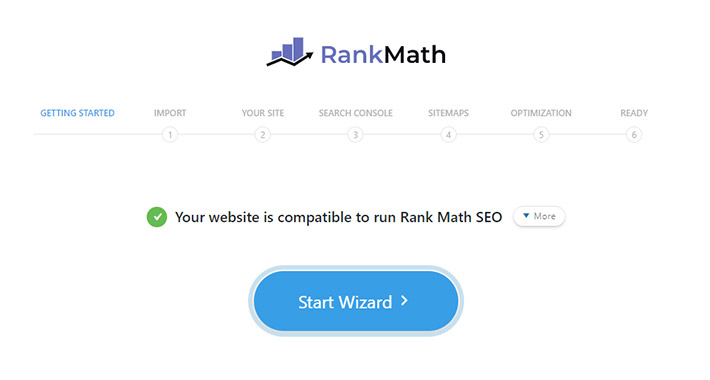
2. Integration of Rich Snippets
If you install Rank Math, you will also get full Google Schema Markup (also known as Rich Snippets) support – in fact, you get it for 14 different types of snippets, which will allow you to optimize your posts in no time.
3. Module-Based System
Rank Math comes with an extremely useful set of modules that you can enable or disable according to your preferences. These let you create a more personalized experience with the plugin. Some of these modules include 404 monitor (which controls all 404 error logs on your site), Link Counter, Local SEO & Google Knowledge Graph, Search Console, Sitemap, and more.
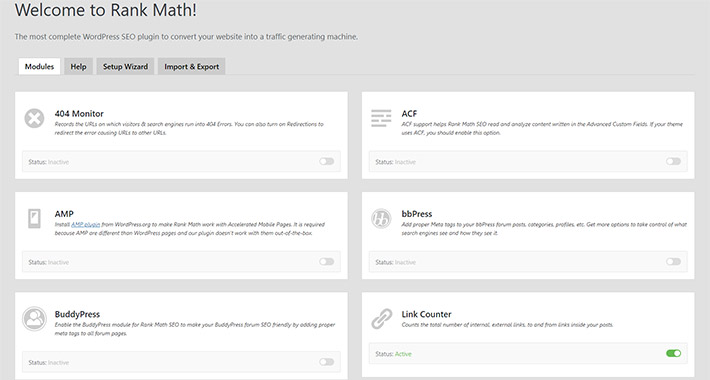
4. Internal Linking Suggestions
Another great thing that you get by installing Rank Math is an Internal Linking Suggestions feature which recommends other posts that you can use for internal linking according to your current posts. This feature gives your posts more chances of ranking higher on search engine result pages.
5. Google Keyword Ranking
The Rank Math SEO plugin also comes with the possibility of tracking your Google keyword rankings. With this strategy, you will be able to keep track of your website’s ranking position and will recognize what you’re doing right (or wrong) more efficiently, so that you can improve your SEO accordingly. Combined with a good understanding of what keyword research is and the implementation of these techniques, this Rank Math feature can help you get extraordinary results.
1. Links
In this tab, you can set everything related to your links and URLs, such as removing stopwords from permalinks, stripping category base from category archive URLs, turning on and off redirect attachments, opening external links in a new tab/window, etc.
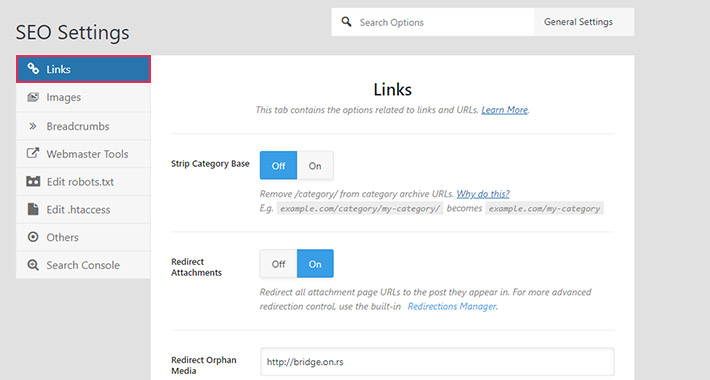
2. Images
Here you can enable the Add missing ALT attributes option, which will add alt attributes to all your images for which you didn’t set any alt text.
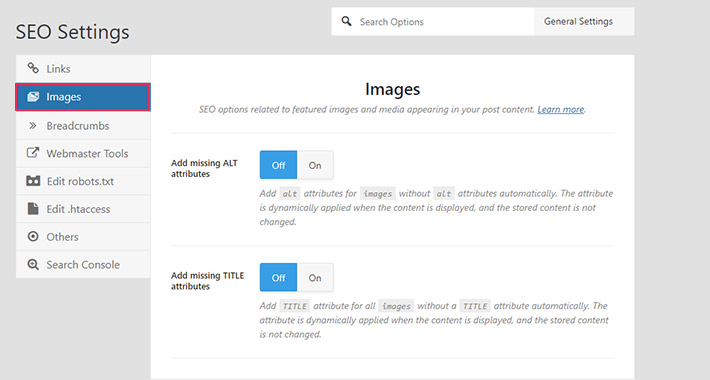
Similarly, the Add missing TITLE attributes option will automatically add the title attribute to all the images without a title.
3. Breadcrumbs
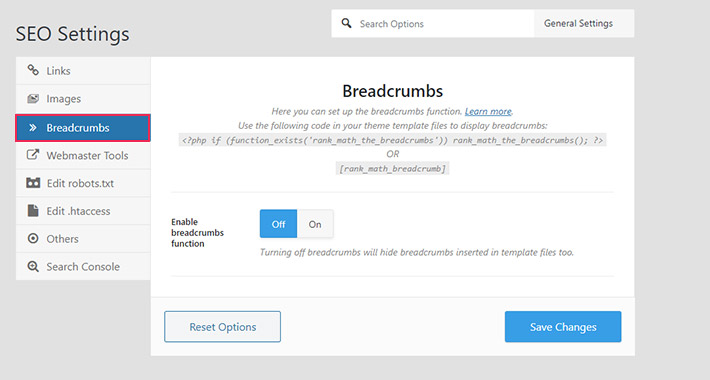
Here, you can set up breadcrumbs. By enabling the breadcrumbs function, additional options will appear, such as the ability to choose the separator character for your breadcrumbs, choosing whether you want to display homepage breadcrumb or not, setting up the homepage label, and so on.
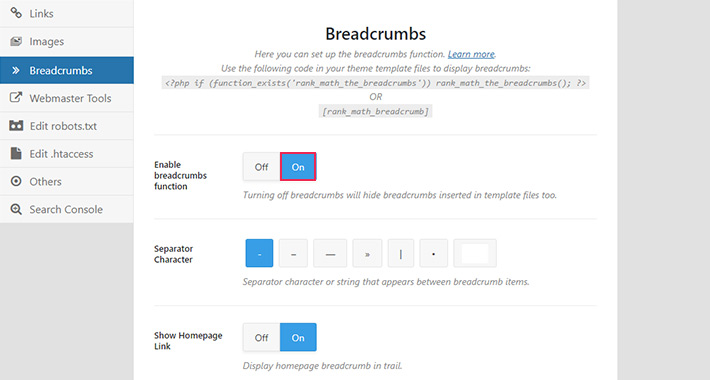
4. Webmaster Tools
The Webmaster Tools option lets you verify your website with different third-party webmaster tools, like Google Search Console, Bing, Baidu, Alexa, Yandex, Pinterest, and Norton. You can do this by pasting full HTML tags or just the ID codes.
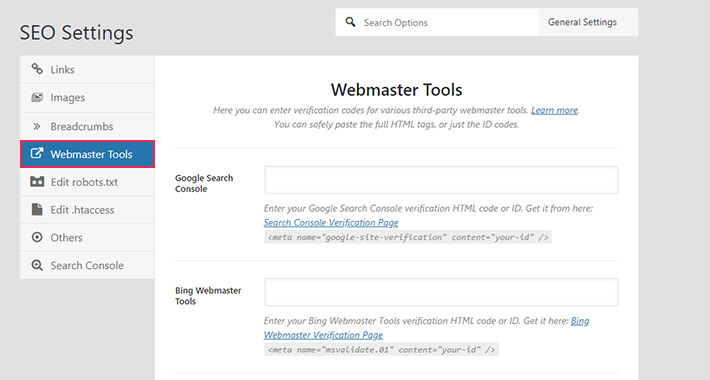
5. Edit Robots.txt
This option allows you to edit the robots.txt file, which helps search engines figure out the parts of your website that you want crawled and indexed. However, we have to note that this option won’t work if you have an actual robots.txt file in your website’s root folder. In that case, you’d have to edit the file there, or delete it and then generate a new one and edit it through Rank Math.
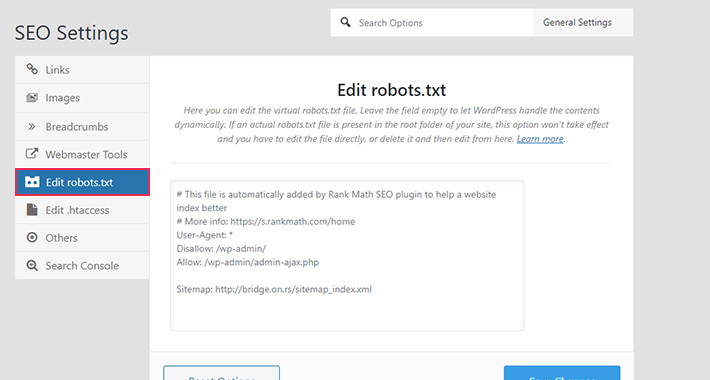
6. Edit .htaccess
The .htaccess file is mainly used to control permalinks and redirections. And Rank Math lets you edit it directly from your WordPress admin panel.
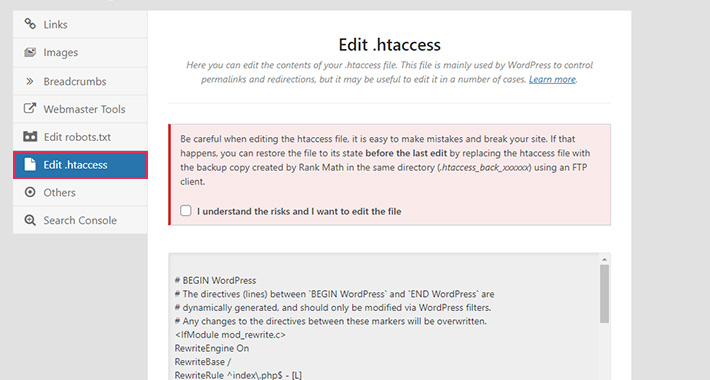
We advise you to be careful when editing this file though, as it is easy to make a mistake which can cause damage to your website. Luckily, there is a way to restore the file to its original state by replacing the .htaccess file with Rank Math’s backup copy via an FTP client.
7. WooCommerce
If you have WooCommerce installed and use it for selling your products, then this option will be quite useful to you. Here you will be able to optimize your URLs and WooCommerce product pages.
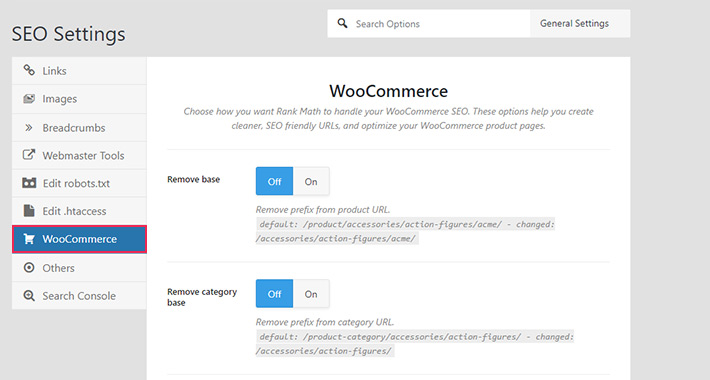
8. Others
This last option contains various settings that couldn’t fit into any of the above-mentioned categories. For example, here you can turn on or off usage tracking, choose whether you want to show the SEO score or not, modify the way your RSS content looks like, and so on.
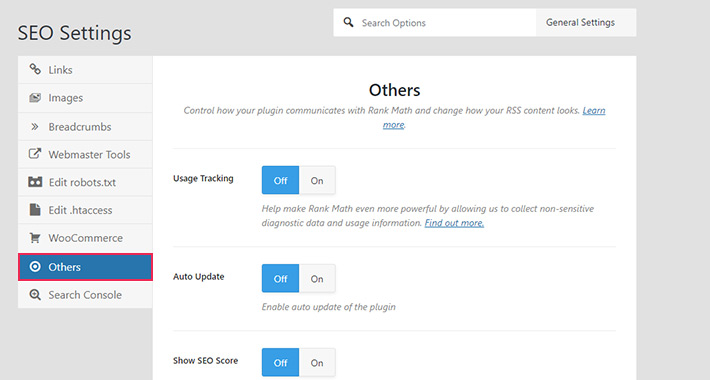
Despite all its handy features, Rank Math wouldn’t be an SEO plugin deserving of our attention if it didn’t also provide its users with the means to analyze their content in an efficient and practical way. Similarly to the Yoast SEO plugin, Rank Math also analyzes the overall SEO score of your pages and posts (the score can go from 1 to 100) and lets you know what you can (and should) improve for better ranking.
But unlike Yoast, which separates its analysis in 3 different tabs (SEO, Readability, and Social), Rank Math divides its analysis into 4 tabs, called General, Advanced, Schema (Rich Snippet), and Social. To give you a better idea of how Rank Math handles content analysis, we’ll go through each one of these tabs separately.
If you use the classic editor for creating your posts, all your Content Analysis options will be located right underneath the post edit. But if you use the Gutenberg editor, you will find the Content Analysis tab by clicking on the three vertical dots located in the upper right corner of the screen (right above the Document and Block fields) and choosing Rank Math.
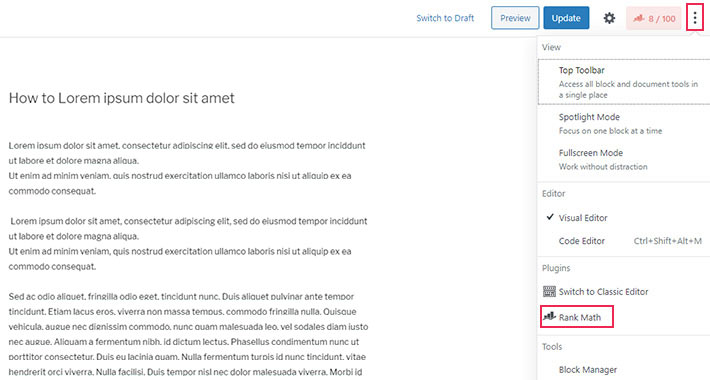
1. General
Even though it’s distributed differently, the General tab contains most of the options you can also find in Yoast’s SEO and Readability tabs. Here’s a list of what you’ll see when you access it:
1) SEO title, the page/post’s unique URL, and meta description – you can edit all three by clicking on Edit Snippet.
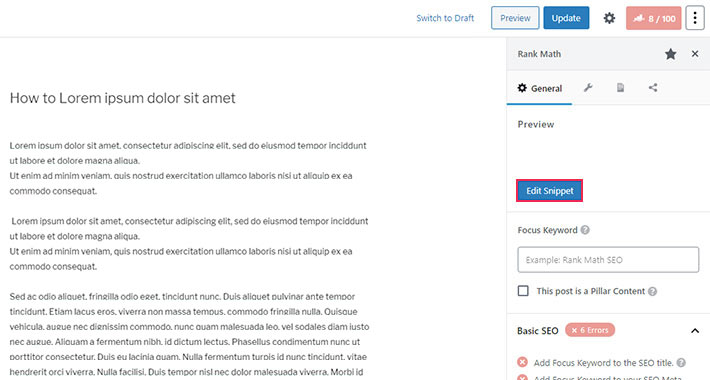
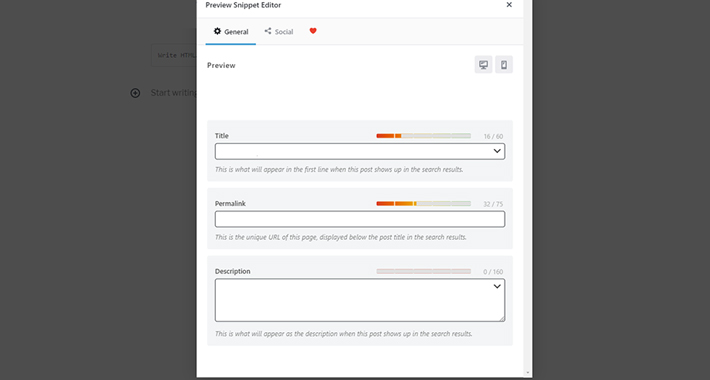
2) Focus Keyword – Rank Math allows you to enter up to 5 variations of keywords you want to rank for, which is something you can get with Yoast SEO only if you buy the premium version.
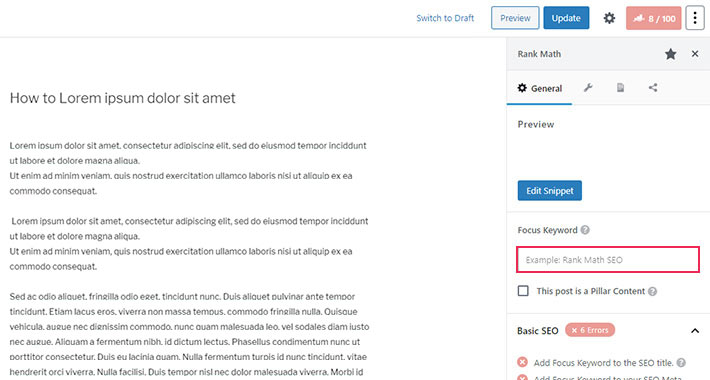
3) Basic SEO – here you will get an insight into:
-
Whether your focus keyword appears in your URL, SEO Title and Meta Description
-
Whether the focus keyword is present in your content
-
Whether the focus keyword appears at the beginning of your content
-
The optimal length of your content.
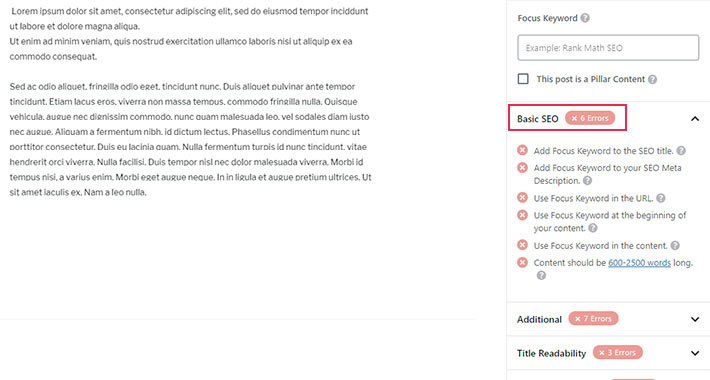
4) Additional – here, Rank Math lets you know the following:
-
If you added the focus keyword in the first place
-
Whether your URL has an optimal length
-
If you used your focus keyword in your subheadings
-
Is your keyword density is optimal
-
Whether you added internal links in your content
-
Whether the focus keyword appears in your images’ ALT text
-
If you should add any external links
-
Whether you need to add DoFollow links pointing to external resources.
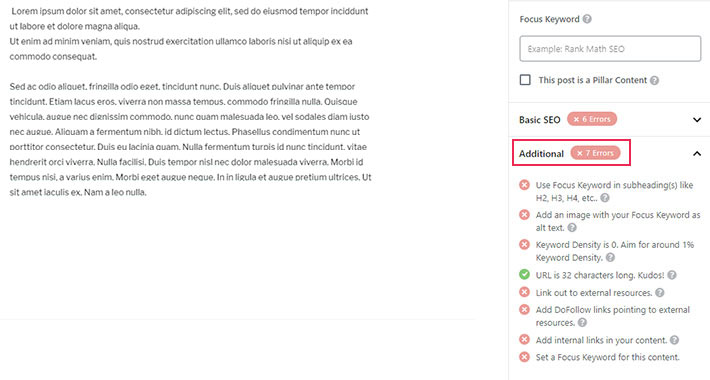
5) Title Readability – in this particular section, you will be notified if:
-
There is a focus keyword at the beginning of the SEO title
-
Your title has a positive or negative sentiment word
-
The title contains power words
-
The title contains a number.
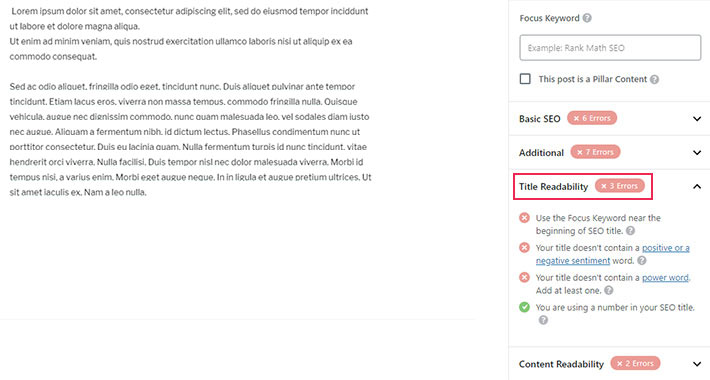
6) Content Readability – this segment analyzes the entire content of your page or post. This includes:
-
Checking if you use the table of contents to break apart your content into smaller pieces (which will make it easier to read)
-
Letting you know if your paragraphs are concise (or not)
-
Suggesting that you add some images and/or videos in your content if you haven’t already
-
Checking your Flesch Readability score.
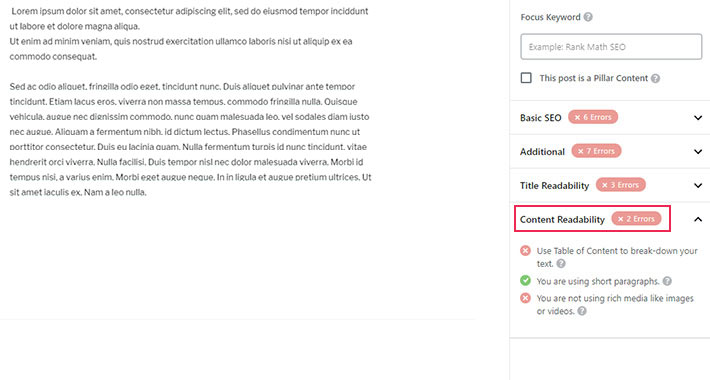
2. Advanced
This tab contains a few additional advanced options that make setting up the more technical part of your SEO easier. The options you can find here include Robots Meta, Advanced Robots Meta, and Canonical URL.
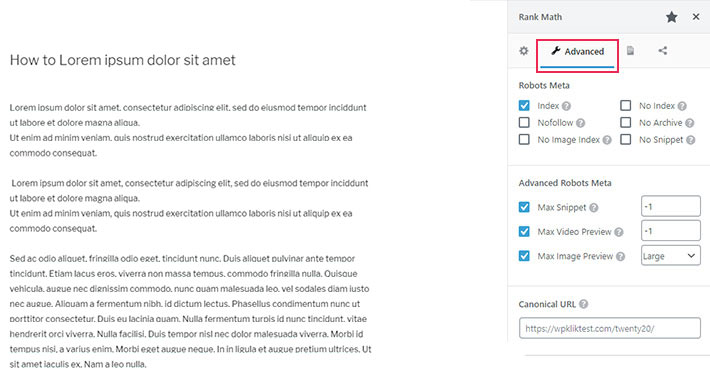
1) Robots Meta – this particular option allows you to instruct search engines how to crawl and index your website’s posts and/or pages.
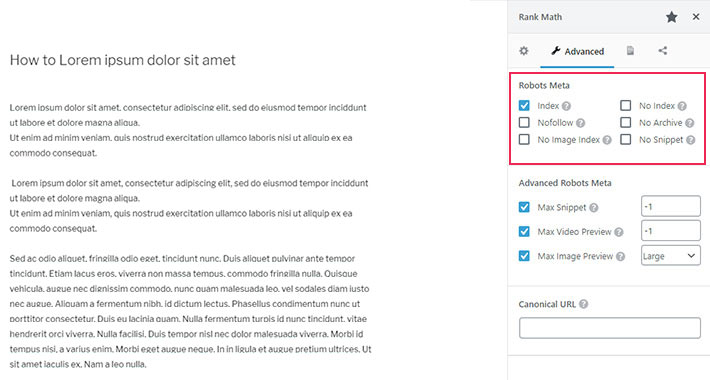
There are 6 different types you can pick:
-
Index – tells search engines to crawl and index your pages
-
No Index – prevents pages from being indexed and displayed in SERPs
-
No Follow – stops search engines from following your pages
-
No Archive – search engines won’t show cached links for your pages
-
No Image Index – prevents images from being indexed by search engines
-
No Snippet – snippets won’t be displayed in search results
2) Advanced Robots Meta – here you can set a few other advanced options, such as:
-
Max Video Preview – similarly, you can specify a maximum duration of your video preview
-
Max Snippet – you can enter the maximum text length (in characters) of your page’s snippet
-
Max Image Preview – finally, here you can set a maximum size of the images on your page (large, standard, or none)
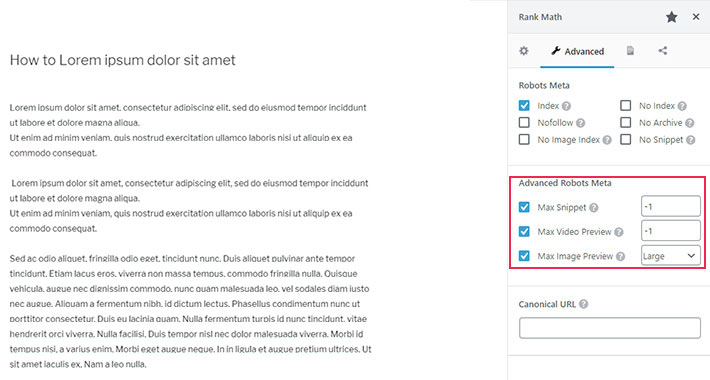
3) Canonical URL – in case you have duplicated content, this option lets search crawlers know which page is the main one.
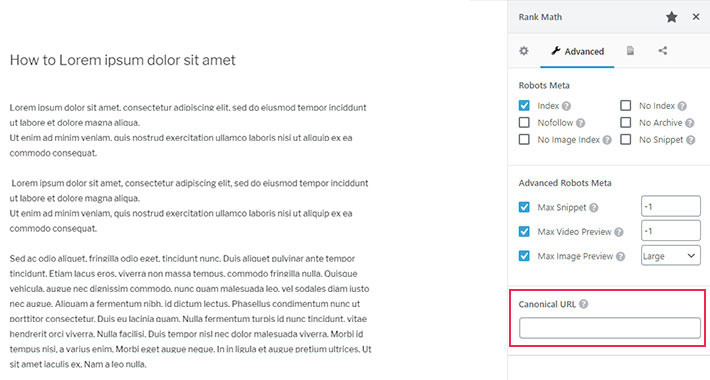
3. Schema (Rich Snippet)
We mentioned rich snippets earlier. These types of snippets stand out from regular snippets because they help search engines learn more about your content, and thus allow them to provide more information related to the users’ queries.
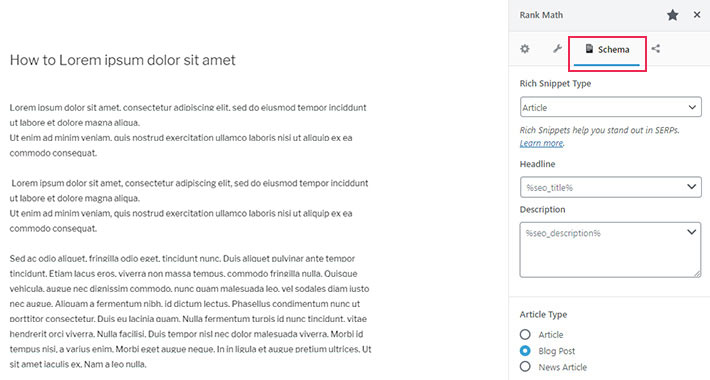
Here you can pick from 14 different rich snippet types (such as Article, Book, Event, Product, Recipe, and so on), set the snippet’s headline and description, and choose the article type you prefer (Article, Blog Post or News Article).
4. Social
As you’ve probably guessed already, the social tab helps optimize your posts for social media.
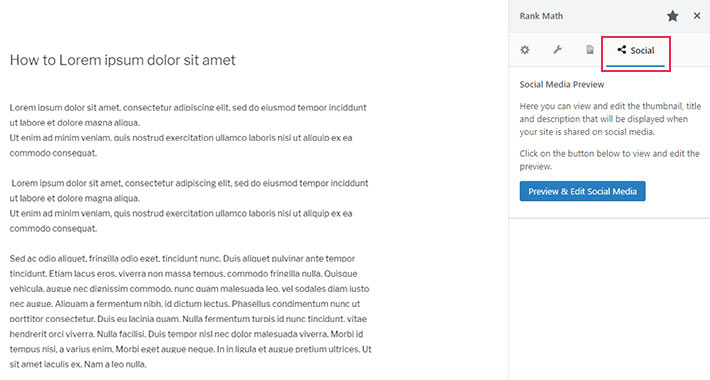
There’s the possibility to see a preview for Facebook and Twitter and to add the image that will be displayed, as well as a title and description. For Twitter there’s also an option of choosing the card type.

Titles & Meta
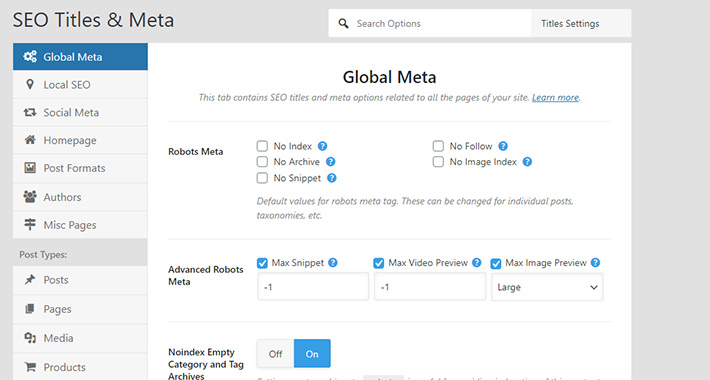
This entire section contains different SEO options such as Global Meta (where you can set all the meta options of your pages), Local SEO, Social Meta, Authors, and so on. Additionally, you get to adjust SEO options for different post types, as well as post and product categories and tags.
Sitemap Settings
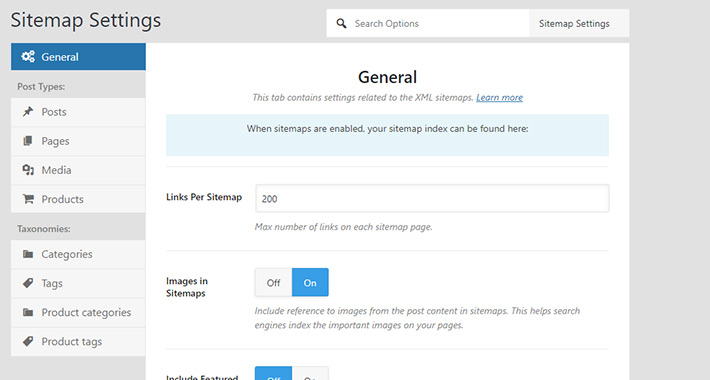
In this tab, you will find all the XML sitemaps-related settings. Apart from the general sitemap settings where you can organize the overall functionality of your sitemaps, here you can also configure the sitemap settings for all post types and taxonomies.
Role Manager
This is a particularly handy option if you have multiple user roles on your WordPress website. Here you can have in-depth control of which user has access to which Rank Math options. To enable/disable any option, you just have to find the user you wish to change the options for and mark or unmark various checkboxes according to your preferences.
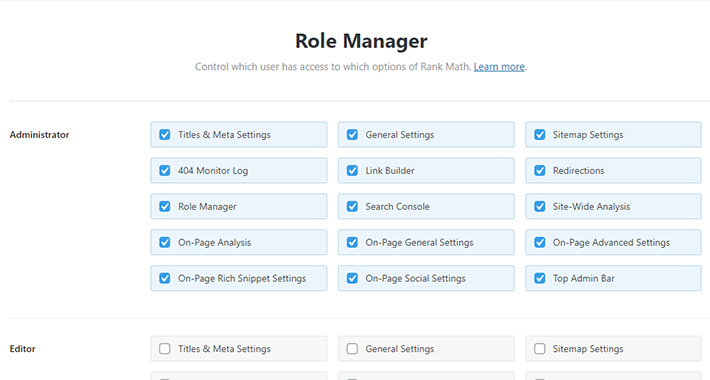
SEO Analysis
Just like Content Analysis, the SEO Analysis tool analyzes SEO of your entire website, points out things you can improve and how to fix them, and lets you know what you’re doing correctly. Here you can start a Site-Wide Analysis which will then provide you with statistics regarding Basic and Advanced SEO, Social SEO, Performance and Security.
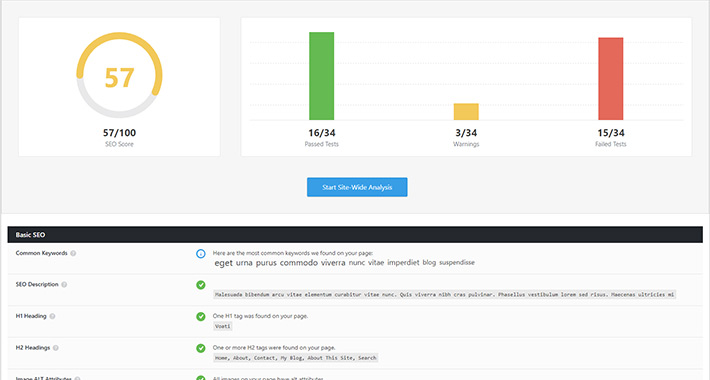
Import and Export
Finally, Rank Math’s Import and Export setting offers the possibility of exporting all its settings and meta data so that you can reuse them on another website or blog, or importing previously backed up settings. Also, you can import all the settings and meta data from other plugins, such as Yoast SEO.
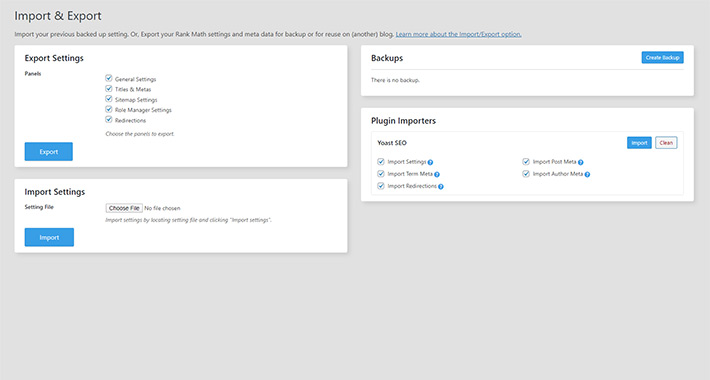
What’s the Takeaway?
As a plugin that offers a plethora of cool features despite being completely free, Rank Math SEO is threatening to become a serious competition to other popular SEO plugins. However, it still needs to stand the test of time in order to earn the title of the next best SEO plugin. In the meantime, if you want to sharpen your website’s SEO and have yet to decide on a plugin, or you simply like the idea of getting such a wide array of features free of charge, we do encourage you to give Rank Math a try.






